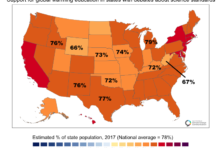The Climate Corner
- Share
- Tweet
- Pin
- Share
There’s been a lot of talk about energy these days…natural gas fracking, high-voltage power line disputes, gasoline prices, and media buzz about the newest high-mileage car, in-home energy efficiency gadgets, and the serious climate change impacts of burning fossil fuels, particularly coal.
These are good conversations to have. But it’s time we get serious. It is time we start thinking about energy conservation and efficiency as though our future depended upon it.
Because, in fact, it does.
Our economy, our jobs, our global climate and the world we’re delivering to our children hinge on energy-use decisions we’re making today. These are personal decisions. They’re business decisions. They’re decisions we’re making as a state and nation.
What is absolutely clear to me as the president of a nonprofit business that builds energy conservation and efficiency programs around the country is that if we get serious about this, we can succeed and create extraordinary opportunities.
Energy conservation and efficiency are essential to improve our global market competitiveness, grow new industries and businesses, spur re-investment in infrastructure, and create jobs, as well as help preserve Earth’s temperate climate.
This is neither liberal nor conservative. It reflects classic American values such as efficiency, frugality, investing today for future prosperity, and a drive to be the best at what we do.
So let’s get serious. We can do this. And we must.
Individual actions that require little sacrifice reap significant benefits. For homeowners, it means relatively small investments, such as installing energy-efficient lighting and insulating and air sealing your home.
It means small lifestyle changes such as turning unneeded lights off and thermostats down a few degrees. For business and industry, it’s investing in new lighting, more efficient transportation fleets, and new manufacturing processes requiring less energy. In many cases, these are good personal and business investments that pay-off in reduced costs, even without the higher purpose of conserving our energy resources.
As a society, however, we also have to think big. We won’t gain significant global competitiveness or affect global climate change simply by changing lightbulbs. We need bolder changes in how we design, live in, and operate our homes and buildings, how we plan our cities, how we commute to work, and how we produce the energy that powers our economy and keeps us warm or cool.
We’re going in the right direction. Americans today use 13 percent less energy per capita than we did in 1978, shortly before then-President Carter declared energy efficiency the “moral equivalent of war.” We realized then how vulnerable we were. Iran had purposely disrupted world oil supplies, doubling gas prices, and creating long lines of panicked motorists at gas pumps.
Carter lost that war of hyperbole. But we learned a lot. We learned we can get serious. We learned we can do this.
In reaction to Iran, Congress and state governments created policies, programs and tax credits to guide and incentivize action. Our incredible private sector created tens of thousands of new businesses and jobs devoted to new furnace design and installation, new lighting systems, new home construction standards and materials – all actions from which we still benefit today.
We now take these advances for granted. We’re still making small, individual conservation decisions. But we’re not serious. Consumers know CFL or LED lights are 80 percent more efficient, for example. But these bulbs are only in a fifth of our lighting sockets today, a pointless waste of electricity generated mostly by power plants that each burn up to 100,000 tons of coal a day.
Small individual decisions. Big consequences.
America still uses loads more energy than most modern economies. Our energy use per capita (and the energy to create a unit of GNP) is close to double the European average and nearly triple China’s.
So we have a long way to go. We’re not even making the easy choices. We’ve grown comfortable with our energy use and accept the bill we pay for it.
Yet, we know fossil fuel supplies are finite. We know we’re still economically vulnerable and those lines of angry motorists will return some day. We know our industries compete with nations that produce goods using far less energy. And we know the world’s glaciers are melting – and why.
Our children will pay a huge price for continued inaction.
That’s why we need to get serious about energy conservation and efficiency on a personal, state and national scale. We’ve shown that, if we do, we can create economic opportunity at the same time.
We can do this. And we must.

Mary Woolsey Schlaefer is president and CEO of WECC, a nonprofit that designs and implements innovative energy efficiency, renewable energy, and financing programs throughout the United States. In her tenure as CEO, WECC has delivered more than 5.3 billion kilowatt-hours of electric savings and nearly 200 million therm savings for customers in 18 states, thereby eliminating more than 11.2 billion pounds of CO2 emissions. Prior to joining WECC, Mary served as deputy secretary and executive assistant for the Wisconsin Department of Natural Resources, where she was a lead energy and environmental policy adviser to then Governor Doyle. Schlaefer has a Juris Doctor (cum laude) from the University of Minnesota Law School and a Bachelor of Arts (honors) from the University of Wisconsin-Madison.
The Climate Corner is a monthly column featuring a variety of writers from around the state and Door County addressing various aspects of the challenges and opportunities climate change presents. The Corner is sponsored by the Climate Change Coalition of Door County, which is dedicated to “helping to keep our planet a cool place to live.” The Coalition is always open to new members and ideas. Contact the Coalition at: [email protected].

